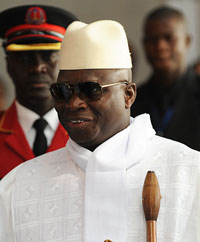Lagos, Nigeria, September 17, 2012–State security agents in the Gambia on Friday ordered two independent newspapers to cease publication immediately but provided no explanation, according to local journalists and news reports.
Agents from the National Intelligence Agency (NIA) in the capital, Banjul, visited the offices of the daily The Standard and the paper Daily News, which publishes three times a week, and told them that the president had ordered both papers to be shut down immediately, according to news reports. The agents told the staff that they could seek an explanation from the president’s office, which oversees the operations of the NIA, news reports said. The officials did not specify how long the suspension would last.
Both The Standard and Daily News have covered the controversy surrounding President Yahya Jammeh’s announcement last month to execute every prisoner on death row, resuming a practice not carried out since 1985, according to news reports. The execution of nine inmates on death row last month drew international condemnation as human rights groups contended that many of the inmates on death row were convicted on politically motivated charges or unfair trials. Following international appeals, Jammeh has agreed to temporarily suspend the executions of 38 other inmates, according to news reports.
The Standard covered both sides of the controversy, including publishing interviews, letters from readers, and public statements opposing and supporting the executions. The Daily News has extensively covered opposition to the executions.
Sheriff Bojang, the publisher of The Standard, told CPJ that he believed his paper was being targeted for its coverage of the executions and that the paper had suspended its daily publication until further notice.
The Daily News issued a press release on Sunday condemning the presidential directive as “unacceptable and unconstitutional,” and said the newspaper would cease operations for a week and then resume publishing “regardless of whether the alleged presidential directive stands.”
“When there is debate over crucial public issues such as capital punishment, that is precisely the moment that the public relies on newspapers to understand the differing viewpoints,” CPJ Africa Advocacy Coordinator Mohamed Keita said from New York. “We call on Gambian authorities to immediately lift censorship orders against The Standard and the Daily News, and allow the papers to inform the public without government interference.”
Pa Louis Gomez, the director of internal security at NIA, told CPJ that he was not aware of the censorship orders. Gomez then hung up and did not answer subsequent calls. Modou Saidy, press director of the president’s office, told CPJ on the phone that he was not aware of the censorship orders and would get more information on the incident, but then did not answer CPJ’s calls.
The Standard has been targeted in the past. The government shut down the paper for eight months between 2010 and 2011 without giving any explanation, Bojang told CPJ.
- For more data and analysis on the Gambia, visit CPJ’s Gambia page here.
